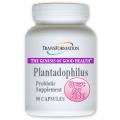

What are probiotics?
“Probiotics” refers to a group of microorganisms that colonize the GI tract, where they live in symbiosis with their host. Within that symbiotic relationship, they provide several benefits to the host, including the synthesis of several important molecules and nutrients as well as the control of potentially pathogenic organisms.
The human gastrointestinal tract hosts over 400 species of mircroorganisms. Some of these are friendly to the human host as mentioned above, whereas others are potentially harmful, should they be allowed to grow uncontrollably. The organisms most frequently observed (according to Mitsuoka) include Enterococci, Lactobacilli, Clostridia, and Staphylococci. [back to top]
What exactly is intestinal flora?
In the scientific literature, flora is defined as the microorganisms that normally inhabit a bodily organ. The natural flora found in the human intestines is referred to as native microbiotica. Microbiota are unique to each individual and affected by diet, lifestyle, and environment. [back to top]
How are probiotics different than enzymes, and why do so many people get them confused?
Probiotics and enzymes are similar in that they both support healthy digestion and a healthy immune system.
Why do I need probiotics?
Taking probiotics, like TPP Probiotic, Plantadophilus, or Transbiotic offers many health benefits such as improved digestion, immunity, and elimination.
Are your probiotics lactose free?
Lactobacillus denotes ”lactic acid producing” or “acid loving.” The term “Lacto” does not indicate a relation to lactose or dairy, as is commonly misunderstood. Lactose may be used in the medium to grow the probiotic culture; however, this is completely removed from the final product. [back to top]
Are your probiotics GI tract stable?
Lactobacilli probiotics are GI tract stable by nature. That is a given according to an understanding of digestion and the nature of probiotics. Some of the bacteria will be lost in transit, but the vast majority survive the GI tract. This is especially true when taken during times when the digestive system is dormant, such as first thing in the morning and at bedtime. When digestion is not in progress, the stomach pH is closer to neutral. Only in the peak of digestion does it hit 2.0 - 3.0, and even then some probiotics survive.
Our probiotics contain live bacteria and are assigned a one-year shelf life. The probiotics are manufactured under refrigeration and inventoried under refrigeration prior to shipment. The products are not shipped on ice as it has been determined unnecessary for short periods of time. However, to help preserve maximum activity for the longest amount of time, we strongly recommend that the customer refrigerate our probiotics to maintain activity once they have been received. You may occasionally come across some probiotics that use an enteric coating. We believe this is used to increase shelf life, and it may improve gastric survival but is not absolutely necessary. Enzyme Essentials prefers refrigeration over enteric coating to avoid the use of additives that provide no nutritional value.
When traveling, it is recommended to only take with you only the amount needed, perhaps in a separate container or pillbox. For short periods of time, non-refrigeration is acceptable. The probiotics may lose a slight amount of activity but do not go “bad” if left in warmer environments. [back to top]
Why isn’t eating yogurt enough for probiotic repopulation?
Yogurt and fermented foods contain “live cultures” that can be beneficial, but they should not be compared to probiotics. Probiotics are specific genera, species, and strains of bacteria that have been isolated and identified with certain characteristics. The live cultures in most fermented foods have not been isolated and are not the same as probiotics. Additionally, the colony forming units (cfu) in a supplement are often much more concentrated than in food.[back to top]
With so many probiotics on the market, how can I choose a good one for my family’s own situation?
We recommend you review the research available on the specific species and strain. The manufacturer and/or your health professional should be able to provide this information to you. There are many books that list which strains are helpful for specific conditions.[back to top]
Do I need to take a probiotic for life?
Yes. Taking supplemental probiotics confers health benefits to the host by improving the environment and supporting the existing microbiota. The most current research is showing that the native microbiota is quite hardy and well established, however the probiotics are mainly transient (adhere to intestinal cells temporarily), giving rise to the need for continual supplementation.
If I am on an antibiotic, is it pointless to take a probiotic?
No. In fact, it is very beneficial to take probiotics while on antibiotics. They support the growth and maintenance of the native microbiota, and many of the strains being studied are actually resistant to antibiotics. Several studies show the beneficial effects of probiotic supplementation, in particular its ability to reduce antibiotic diarrhea.
Can I take too many probiotics?
The general answer is no, however the species, strains, and activity per dose should be suited to the individual’s health needs.

Classic Formula! Single-strain, GI stable probiotic
 |